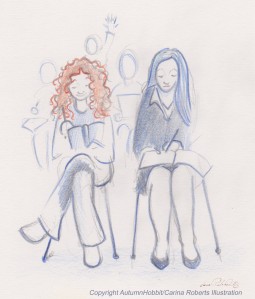
Hello again, lovely readers!!
Apologies in advance as this post will be pretty text-heavy, but it’s something a little special too: I attended the annual London Book Fair last week, and felt it deserved a piece of writing all to itself. I typed up my notes on the train, and it evolved into an article of sorts: a writeup which I hope might aid any students or recent graduates who are considering going in the future! I know all too well that it’s easy to be overwhelmed the first time attending a big event like this, but I know you can all do it!
A quick overview, first: here is the main hall of the Book Fair, which takes place in Olympia, Kensington:
The price is really pretty good considering what you can get for your money: a ticket will set you back £30, but it allows you to enter 100% of the seminars that are held on a range of subjects for free: including tech, crowd funding, publishing, literacy, authorship, illustration, and many more. It also allows you access to hundreds of business’ stands: people that could prove to be useful contacts in the future, as well as a great research facility if you’re looking to explore who does what in a particular field. If you want to, you can pay extra for specialist conferences that are advertised on the fair’s website, but it’s by no means compulsory. Most of the events that happen over the 3 days are included in the ticket price.
I attended this year with an author friend of mine; we got up pretty early indeed to make the most of our time (it was dark when we set off!) We were in the building by about 10:30 on the Tuesday morning, after dropping our things off at a BNB (a recommendation for anyone who has a long travel is to book one night in a cheap hotel or BNB- go with a friend, and share a twin room, you’ll be able to split the cost: we ended up paying only £27 each for the room.)
As to what happened over the two days we spent there, I’ve compiled the best bits of my notes for a write-up of three of my favourite free seminars, as well as a top 8 general tips I noted down to help new visitors to make the most of their time there. I hope this is helpful to all of you, particularly the first timers for next year!
The Seminars: My highlights!

“How the conversation between publishers and authors go: a conference” – This was a discussion between a panel of four top publishers and authors, about their experiences with the industry: how they got started, about specific books which brought them success, etc etc. They also discussed issues of censorship: particularly from the authors’ perspective, about that conundrum of whether you should change your writing to fit what publishers want, or whether you should keep your vision of work how you imagined, and just find the publisher who fits it. (Particularly interesting as one of the authors here was Melvin Burgess, one of the pioneers of the Young Adult genre of fiction as we know it today. He deals with a lot of controversial issues in his writing, specifically drugs and sex, from a young person’s perspective. One of the most interesting things with this was, Klaus Flugge, founder of Andersen Press, took him on even though there wasn’t really a genre for his particular style of writing at the time. Of course, Burgess received a LOT of criticism about the way he spoke about such controversy, particularly from adults who agreed that while the topics needed to be addressed, they perhaps didn’t know how talk about them with their own children: considering their direct confrontation to be threatening, or potentially harmful. However, Burgess confirmed that he had received shining reviews from his actual readership: he sold thousands and thousands of these books to the young people themselves, who liked the directness of his approach: a “real education”. This whole conversation was very applicable to the illustration market in the current climate; how certain things are forbidden from being shown in picture books: alcohol, cigarettes, and even sweets to name but a few examples, as some people are worried that their depiction may cause harm to impressionable children.
“Reading for pleasure- Illiteracy” “Read On, Get On” –
“It is your attitude to reading that releases your potential.” A talk about the failing level of literacy in England, how so many people have been affected as a result, both children and adults: and how the initiative, “Read On, Get On”, (set up to help everyone who needs some support to develop their literacy), helps to open up opportunities for them in the future. The campaign currently has the support of around 12 different charities, as well as backing from the government and famous authors/illustrators/academics. To find out more, look up “Read On, Get On” / #ReadOnGetOn on Twitter, or look up the National Reading Strategy. (A topic very close to my heart- I’ve always loved reading, and want to bring this joy and power to others!)
“LBF Illustrators afternoon”
For any aspiring or practicing illustrators, this is one of the most helpful and informative of the seminars that the London Book Fair has to offer, and it runs every year! They have a few different representatives from different publishing companies (this year, Scholastic and Bonnier Publishing, an imprint of Templar) who introduce themselves and their positions within the company (e.g. Creative Director for Under 6s, Designer, etc etc.) The assisting book fair staff will then come around with small coloured cards, a different colour appropriated to each different creative director/designer/representative, and issue you with a time slot for whoever you want to see. It works rather smoothly, as each meeting is timed to ensure everyone gets an equal opportunity to show off some work and ask questions, and the short slots mean that you don’t really have a chance to trip over your words. I had around an hour spare before my meeting started, so I made notes covering all the different questions or points I wanted to ask, and only showed the pieces of my portfolio that I wanted the most feedback on/thought would be most suited to the client. A fantastic opportunity to learn some names and get your foot in the door- once you’ve met someone in person, it’s easier to send them an email or letter with a proper introduction that they will actually read!
Top tips for the fair in general: survival and success!
1) JUST GO. If you think that you might find the experience helpful, or have any inkling you might want to go, don’t make up excuses as to why you can’t, just do it! Money can always be saved, arrangements can be made well enough in advance as to not be an issue.You won’t regret it!
2) Try and experience as much as you can while you’re there.
Don’t kill yourself doing it, but try and fit in as much into your days as you possibly can. Look at the programme beforehand, pick out a few talks you think you’ll find most interesting (if you’re like me you might have to be more selective from this list when you actually get there, as there are simply not enough hours in the day!) Don’t keep to a rigid schedule necessarily, be flexible! If you get into a conversation with someone which means you might miss one of your talks, don’t worry! You have no idea how much you might learn, or what opportunities you could gain from the interaction!
3) Take a notebook:
The most useful bit of kit you can take, aside from your ticket, is a notebook and pen. (Several pens, in case the first pen leaks all its ink into your bag.) Take it to the seminars, scribble as the speakers talk. If you have a conversation with someone and swap cards, summarise your conversation in the book. You could even copy their contact details into the book, then even if you lose a business card you don’t need to panic or kick yourself about a lost opportunity. You can plan meetings, questions you want to ask, and exactly what work you want to show. If certain meetings don’t go as well as you’d hoped, you can think about why you weren’t happy with the outcome and make notes for next time.
4) Don’t try and blinker your choice of talks and seminars to those just directly concerned with your field/profession.
For example, I attended a few talks that were concerned with authorship/reading, which you could argue aren’t DIRECTLY related to illustration (although they are linked) – but all the information is transferrable. You might even get chatting to someone you can collaborate with!
5) Leave time to have a wander around!
Again, try not to overcram your day and wear yourself out while still experiencing as much as you can. Since we were up at 4 in the morning on the Tuesday morning, we only had a certain amount of energy to spend, and a certain amount of attention for sitting through seminars in warm rooms without falling asleep. Wandering around stretches your legs, and reveals a world of new opportunities you might forget you have: particularly if you work from home, it’s easy sometimes to feel isolated and limited to a small list of routes for your illustrations to take. Having the sheer magnitude of options for your work sprawled out like this in front of you can be terrifying for even the hardiest of veteran illustrators; just try to think of everything you see as a possible job in the future, every company a possible employer, and it will INSPIRE you, not scare you!
6) The heads of companies, the creative directors and founders, are only people too, the same as you!
It’s sometimes easy to forget, when you’re firing off samples, projects and book proposals left right and centre that a real person will actually look at them. In bigger corporations, no matter if you write a letter, send a hard copy or try and speak to someone in person, it will often feel that there is an invisible wall between you and that mythical beast known as the Creative Director; and it’s impossible to be HEARD by anyone who could make a decision on your work. The editors I met during this trip, I can confirm, were real people, flesh and blood, and they were actually quite lovely! Don’t be afraid of the high-ups, just put yourself forward to speak to them at any chance you get: it’ll make you feel better that you took the step and proved to yourself that you could do it! Besides, I always think it’s a lot easier to convince someone IN PERSON that you’re a worthy use of their time and resources, and to forge a successful business relationship! I was told a few months in advance of my trip not to apologise for anything, and to remain confident (at least to the naked eye!) – I.e. if there was any overly authoritative figures scattered about, then I’d be in the best position to stand my ground and prove myself as a young illustrator. Keeping this at the back of my mind throughout every meeting actually helped a lot!
7) Take a friend!
* A friend who has an interest in the fair, but not necessarily all the same things as you. Arrive together, then split up for a few hours. If you both attend different talks, you’ll have twice the notes. When you get chatting to people, you can big them up as well as yourself, and note down potential clients for them, and request the same of them. If a meeting doesn’t go as well as you hoped it would, you have someone to give you a hug and set you back on track again. And, as mentioned previously, it could make hotels a lot cheaper!
8) Be brave, and remember to smile!!
When you book your ticket for the book fair, you fill in your name and a couple of details about you and your business on the website, which they translate into your printable, foldable pass, which slots neatly into a plastic wallet they provide when you arrive. This little piece of paper is BRILLIANT, because it’ll tell people who you are and your field of interest/expertise before you even talk to them! Many conversations I had came from someone looking at my badge and seeing “illustrator” on there!
Being brave is taking that first five steps into the building, remember that. By not turning and running away from a huge hall filled with people, you are a step closer to achieving your dream!
Anyone who reads this blog who knows me personally will be very aware that I cannot go an hour without smiling at someone or about something. I am very pleased to announce that during this adventure to old London town, I managed to get two people to smile at me on the tube (two!) and in the halls of Olympia, in the two days of the fair, my smiling actually started several very interesting conversations with some really lovely people, who may also prove to be interesting contacts over the coming months. I stick wholeheartedly to my belief that smiling at people not only makes you feel better, it makes you approachable and accessible to them. Teamed with your badge at the London Book Fair, people will soon be running to speak to you!
I hope this has been an interesting read, and something a little different! It’s actually been one of the quickest posts to write, how about that! I wish you all the success in your coming month before I get around to writing again, and enjoy some of this gorgeous early summer sunshine! Trust in everything you do. If you approach all with a positive attitude and bravery, who knows what tomorrow might bring!
– The AutumnHobbit
© Carina Roberts and AutumnHobbit. Unauthorized use and/or duplication of this material without express and written permission from this blog’s author and/or owner is strictly prohibited. Excerpts and links may be used, provided that full and clear credit is given to Carina Roberts and AutumnHobbit with appropriate and specific direction to the original content.


